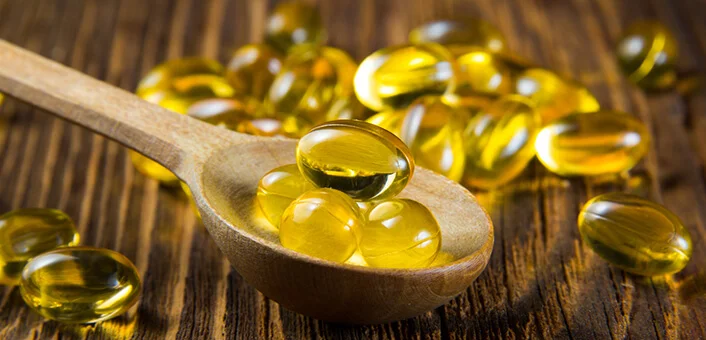
Polycystic Ovarian Syndrome
How Cod Liver Oil Helps Women With PCOS
Sep 8, 2017Are you on a journey to treat PCOS naturally? It’s time to add the mighty Cod Liver Oil into your repertoire of supplements! Rich in Omega-3 fatty acids, it will improve hormonal balance to make your menstrual cycle more regular. But at the same time, cod liver oil also helps clear up acne-prone skin, treat hirsutism and improve your insulin sensitivity.
Why Cod Liver Oil?
As you may already know, low-grade systemic inflammation lies at the heart of PCOS. Research shows that Omega-3 supplementation could reduce serum concentrations of testosterone and regulate menstrual cycle.
While all fish oils are rich in Omega-3 fatty acids, and hence great for naturally treating PCOS, Cod Liver Oil is extra-special. Made from the liver of cod fish, it is great for hormonal, reproductive and neurological health. Cod Liver Oil contains potent anti-inflammatory properties, thanks to the rich omega-3 fatty acids along with high doses of Vitamin A and D in it. Most other fish oils are lacking in Vitamin A and Vitamin D, which is what makes cod liver oil superior to ordinary fish oils.
Cod Liver Oil is known to contain 7% of both EPA (eicosapentaenoic acid) and DHA (docosahexaenoic acid). While the former fights inflammation, the latter boosts function of the brain and CNS (central nervous system). It’s also known for containing more Vitamin A and D per-unit-weight than any other common food.
9 Benefits Of Cod Liver Oil For Your PCOS
The rich omega-3 fatty acids in cod liver oil are a good way to balance out your omega3:omega6 consumption.
Remember – excess omega-6 fatty acids in your diet encourage inflammation, which is bad news for women with PCOS.
If you aren’t taking a cod liver oil supplement for PCOS just yet, here is a look at 9 reasons why you should start right away
1. Balances Female Hormones
There’s growing evidence that women diagnosed with PCOS may have significantly lower levels of Vitamin D. Studies have documented improvement of ovarian function and reduction in androgen levels via Vitamin D supplementation in women suffering from PCOS. Vitamin D in Cod Liver Oil could help regulate and balance female hormones.
2. Reduces Inflammation
The Omega-3s in Cod Liver Oil act as natural anti-inflammatory agents. In fact, studies reveal that they may be a safer alternative to NSAIDs. Not only will this help fight low-grade systemic inflammation in patients of PCOS, these also bring relief from pelvic pain that’s common with cystic ovaries.
3. Improves Insulin Sensitivity
Studies have found that Omega-3 fatty acids improved insulin sensitivity in PCOS patients. And what could be better than Cod Liver Oil to increase your Omega-3 intake!
4. Reduces Unwanted Hair Growth
According to a Turkish study, Omega-3 may be also effective in improving hirsutism in patients with PCOS. Once again, Cod Liver Oil is a great choice here, particularly if you are suffering from the debilitating symptoms of hirsutism.
5. Improves Symptoms of PMS
PCOS is also often accompanied by symptoms of PMS (premenstrual syndrome). This is due to erratic hormonal fluctuations and irregular menstrual cycles. A Pilot Study found that Omega-3 supplementation can reduce symptoms of PMS including bloating, headache and breast tenderness. It may also reduce the psychiatric symptoms of PMS including depression, nervousness, anxiety, and lack of concentration. Try Cod Liver Oil capsules to say buh-bye to those troublesome PMS symptoms.
6. Decreases Heart Disease Risk
PCOS is known to increase risk of cardiovascular disease. Omega-3 fatty acids may decrease the risk for cardiovascular disease through the improvement in paraxonase-1 activity and reduction in some lipids ratio in PCOS women, according to research.
7. Regulates Menstrual Cycle
Irregular menstrual cycle is of the worst things about PCOS, particularly for women looking to get pregnant. Researchers have found that Omega-3 supplementation helps regulate menstrual cycle and reduce serum concentrations of testosterone. And Cod Liver Oil is an excellent source of both EPA and DHA.
8. Reduces Fatty Liver Disease
There is an association between non-alcoholic fatty liver disease (NAFLD) and the polycystic ovary syndrome (PCOS). Marine-derived omega-3 fatty acids, like Cod Liver Oil, have favourable effects on liver fat content and other cardiovascular risk factors in women with PCOS, according to an Australian research study.
9. Fights Acne
If you are struggling with cystic acne, thanks to PCOS, Omega-3 enriched Cod Liver Oil can help clear up your skin. DHA and EPA Omega-3 fatty acids fight acne by controlling skin inflammations, according to studies. Additionally, the Vitamin A in Cod Liver Oil helps in clearing acne scars by encouraging skin repair and regeneration. Plus Vitamin D has potent antioxidant and anti-comedogenic properties that help prevent skin damage.
How To Buy Cod Liver Oil
Now that you’re convinced Cod Liver Oil is a wonderful supplement for the treatment of PCOS, its time to buy some. When looking to buy Cod Liver Oil supplements, make sure you check the Vitamin A and Vitamin D dosage carefully.
Since cod liver oil is so popular, a lot of low-quality supplements can have large amounts of Vitamin A as compared to Vitamin D.
We have seen plenty of cod liver oil these days that has had a large part of the vitamin D removed during processing. This can lead to problems like Vitamin D deficiency, and even Vitamin A toxicity in worse cases. This is because Vitamins A and D work in synergy in the body. If you consume too much vitamin A compared to Vitamin D, and live in a cold, harsh climate where you don’t get enough sunlight for your body to make sufficient Vitamin D, you could easily become Vitamin D deficient. Ideally, a good brand of Cod Liver Oil should contain 1 unit of vitamin D per 10 units of Vitamin A. For example – 10,000 IU vitamin A and 1000 IU vitamin D per dose are considered safe.
If you are brave, you can take Cod Liver Oil in liquid form. Store the bottle in a cool, dark place and protect it from heat. If you can get your hands on it, try Fermented Cod Liver Oil which is the pure, authentic form that’s been around for centuries. However, if you find liquid cod live roil unpalatable, you can opt for enteric-coated capsules.
Want To Explore More? Checkout Sepalika Polycystic Ovary Disorder (PCOD) Program
References:
- The effect of omega-3 supplementation on androgen profile and menstrual status in women with polycystic ovary syndrome: A randomized clinical trial – https://www.ncbi.nlm.nih.gov/pubmed/24639805
- Vitamin D deficiency is common and associated with metabolic risk factors in patients with polycystic ovary syndrome – http://www.sciencedirect.com/science/article/pii/S0026049511000588
- Omega-3 fatty acids (fish oil) as an anti-inflammatory: an alternative to nonsteroidal anti-inflammatory drugs for discogenic pain – https://www.ncbi.nlm.nih.gov/pubmed/16531187
- Evaluation of the effect of omega-3 fatty acids in the treatment of premenstrual syndrome: “A pilot trial” – http://www.sciencedirect.com/science/article/pii/S0965229912001744
- Omega-3 fatty acids improve glucose metabolism without effects on obesity values and serum visfatin levels in women with polycystic ovary syndrome – https://www.ncbi.nlm.nih.gov/pubmed/23529993
- Benefits of omega-3 Fatty acids supplementation on serum paraoxonase 1 activity and lipids ratios in polycystic ovary syndrome – https://www.ncbi.nlm.nih.gov/pubmed/24688934
- Omega-3 fatty acid supplementation decreases liver fat content in polycystic ovary syndrome: a randomized controlled trial employing proton magnetic resonance spectroscopy – https://www.ncbi.nlm.nih.gov/pubmed/19622617
- Efficacy of omega-3 in the treatment of polycystic ovary syndrome – https://www.ncbi.nlm.nih.gov/pubmed/23550861
- Effect of Dietary Supplementation with Omega-3 Fatty Acid and Gamma-linolenic Acid on Acne Vulgaris: A Randomised, Double- blind, Controlled Trial – http://www.ingentaconnect.com/content/mjl/adv/2014/00000094/00000005/art00005




